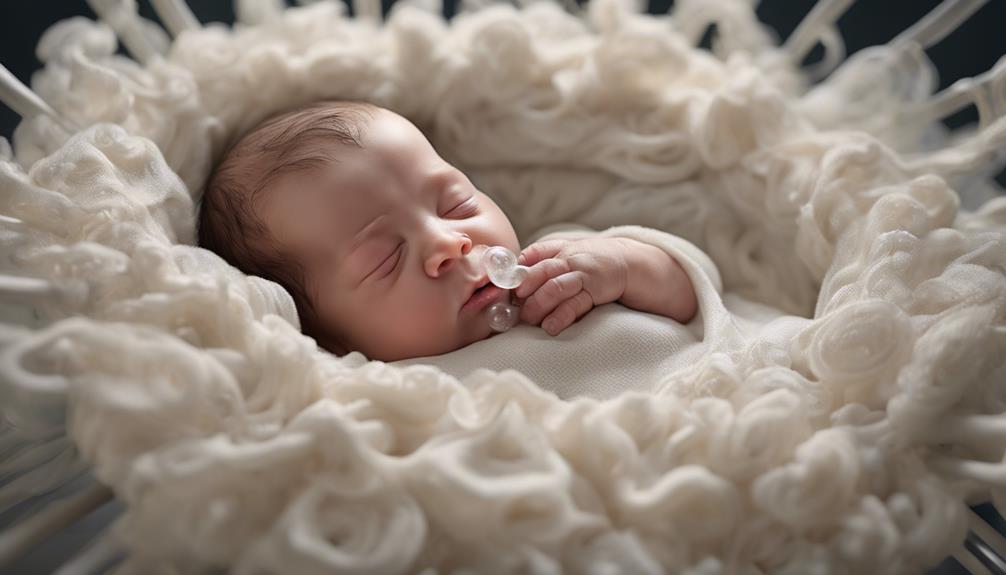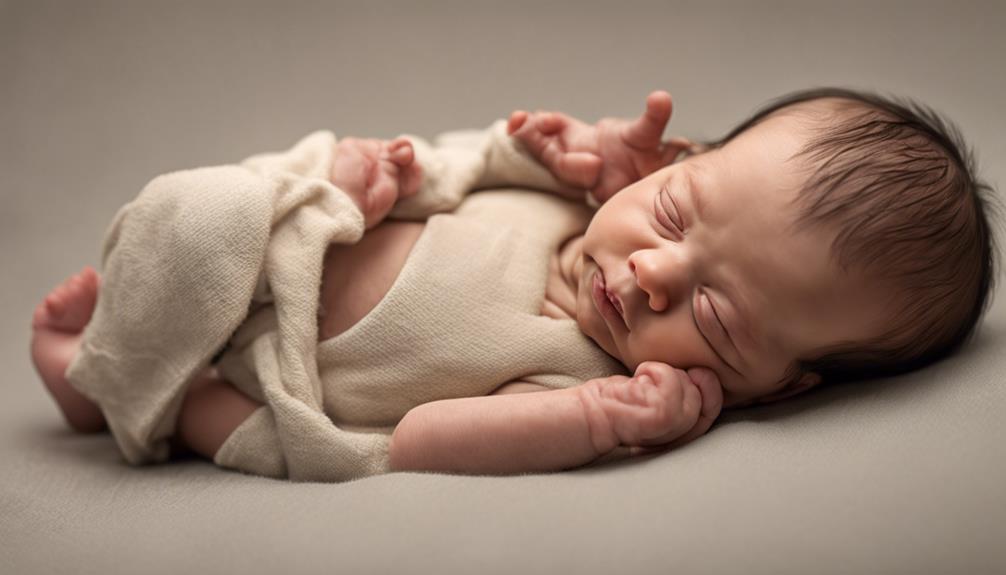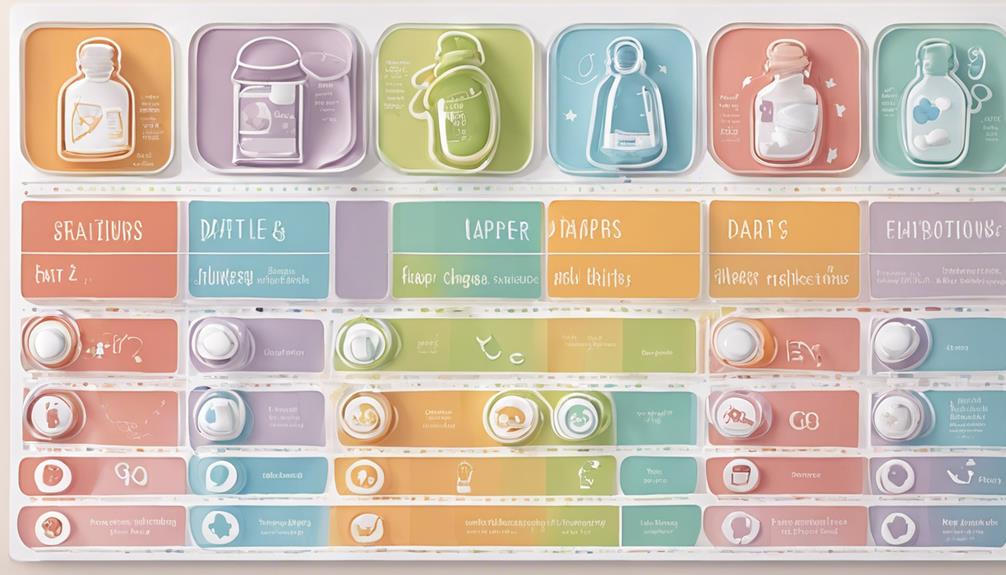If you've noticed that your newborn seems to always have hiccups, there's a reason behind it that you might not be aware of. Understanding the factors that contribute to this common phenomenon can provide insights into your baby's well-being and offer solutions to ease their discomfort.
From practical tips to the science behind those adorable hiccup sounds, unraveling the mystery behind your baby's hiccups can lead to a smoother journey in caring for your little one.
Key Takeaways
- Newborns can hiccup frequently due to immature diaphragms and developing nervous systems.
- Feeding habits like swallowing air or overfeeding can trigger hiccups.
- Proper feeding techniques, burping, and upright posture can alleviate hiccups.
- Prevent newborn hiccups by feeding in a calm environment, burping frequently, and maintaining a consistent schedule.
Common Reasons for Newborn Hiccups
Newborn hiccups often occur due to the immaturity of their diaphragm and developing nervous system. This can be more pronounced in premature babies who are still refining their reflexes. Common triggers include swallowing air while feeding, overfeeding, and sudden changes in stomach temperature. The coordination between breathing and swallowing is also a factor that can lead to these adorable yet sometimes concerning hiccups in your little one.
As your baby grows, these hiccups are part of their normal development and tend to decrease with age. The diaphragm matures, and the nervous system becomes more adept at coordinating different functions. While it might seem worrisome, especially for new parents, understanding that these hiccups are a common occurrence can offer reassurance. Remember, it's all part of your baby's growth journey.
Frequency of Newborn Hiccups

Frequent hiccups are a common occurrence in newborns, often occurring multiple times a day, especially during or after feedings. It can be concerning to see your little one experience hiccups so frequently, but rest assured, it's a typical part of their development. Here's what you need to know about the frequency of newborn hiccups:
- Newborns can have hiccups multiple times a day, with some experiencing hiccups after every feeding.
- The frequency of newborn hiccups is typically higher in the first few months of life.
- Hiccups in newborns are common and often occur during or after feedings.
- It's normal for newborns to have hiccups as their diaphragm and nervous system are still developing.
- The frequency of newborn hiccups tends to decrease as babies grow older and their systems mature.
Impact of Feeding on Hiccups
Having an understanding of how feeding practices can influence hiccups in newborns is essential for ensuring your baby's comfort and well-being. Feeding too quickly or overfeeding may lead to stomach distention, triggering hiccups in newborn babies. It's important to be mindful of how your baby swallows air during feeding, as this can also contribute to hiccups.
Employing proper burping techniques during and after feedings can help release gas, reducing the occurrence of hiccups. Offering smaller, more frequent feedings can prevent overloading the baby's stomach and minimize hiccups. Additionally, keeping your baby upright after feeding and using gentle patting or rubbing on their back can aid in digestion and further reduce hiccups.
Alleviating Newborn Hiccups

To alleviate hiccups in your newborn, implementing proper burping techniques during and after feedings is important for releasing trapped air and reducing their occurrence. When addressing your baby's hiccups, consider the following:
- Confirm Your Baby Upright: Keeping your newborn in an upright position for 20-30 minutes after feeding can aid in digestion and minimize hiccups by allowing gravity to assist in moving gas bubbles out.
- Feed Smaller Amounts: Prevent overfeeding by offering smaller amounts of milk more frequently to reduce the likelihood of hiccups triggered by a full stomach.
- Confirm Bottle Feeding: Confirm the bottle's nipple size is appropriate for your baby's age and that a good latch is achieved during breastfeeding to prevent excess air intake.
- Avoid Feeding Agitated Babies: Try not to feed your newborn when they're overly hungry or fussy, as this can lead to gulping air along with milk, causing hiccups.
- Be Mindful of Feeding Techniques: Pay attention to your feeding technique to prevent unnecessary air intake, supporting your baby's respiratory muscles and reducing hiccups.
Preventing Hiccups in Newborns

If your newborn often experiences hiccups, taking proactive steps can help prevent these occurrences in the future. Burping your baby frequently during and after feedings is vital to release trapped air, reducing the likelihood of hiccups. Additionally, feeding your baby in a calm environment and ensuring they're in an upright position while eating can help prevent hiccups from happening. When bottle feeding, using proper techniques like holding the bottle at the correct angle to prevent air intake can also minimize the occurrence of hiccups in newborns.
Maintaining a consistent feeding schedule and avoiding overfeeding are essential steps in preventing hiccups. Ensuring a good latch while breastfeeding and allowing your baby to nurse at their own pace can also contribute to reducing hiccups. By following these practices and being mindful of trapped air and feeding habits, you can help your newborn experience fewer hiccups and enjoy a more comfortable feeding routine.
Frequently Asked Questions
Why Does My Newborn Get Hiccups All the Time?
Your newborn gets hiccups frequently due to their developing diaphragm and immature nerve control. The sensitivity of their diaphragm and rapid vocal cord closure contribute to this. It's a common part of their growth process.
When Are Baby Hiccups a Concern?
When your baby's hiccups persist for hours, interfere with feeding, or come with symptoms like vomiting or irritability, it's time to seek medical advice. Trust your instincts and reach out to a pediatrician for guidance.
Why Do Some Babies Get Hiccups More Than Others?
Like a gentle rain falling on a quiet night, some babies hiccup more due to immature systems. Factors like fast feeding, large milk intake, prematurity, and coordination issues can lead to frequent hiccups. It's normal.
Is It OK to Lay Baby Down With Hiccups?
Yes, it's okay to lay your baby down with hiccups. Hiccups don't affect breathing and usually go away on their own. If they persist or cause distress, consult a pediatrician. Keeping a baby with reflux hiccups upright can help prevent vomiting.
Conclusion
So, there you have it – your newborn's constant hiccups are just a sign of their developing reflexes and healthy brain development.
Remember, gentle remedies like burping and offering a pacifier can help ease those hiccups without any forceful measures.
Just think of it as your baby's way of practicing for their future talents – maybe they'll be a professional hiccup artist one day!
Just keep calm and hiccup on!










